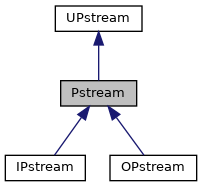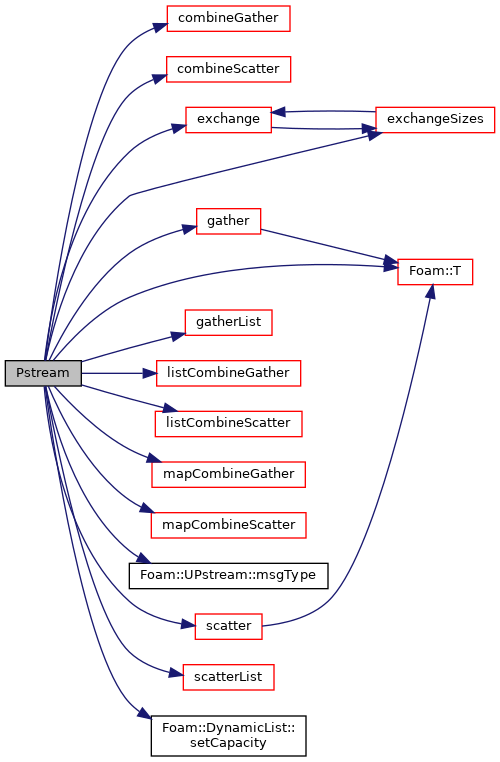对于数值仿真而言,无论是商软或者开源软件,并行计算都是非常重要的,
作为一名仿真工程师,如果想把自身数值仿真能力提升一个层次,需要对并行计算有很好的理解与应用
openfoam并行通信主要通过Pstream类完成
Pstream类,类如其名,parallel_stream,并行计算时使用的信息流
Openfoam对其的介绍是:
Inter-processor communications stream.
处理器间交换信息流
类似的命名方法我们在c++文件读取时说过,std有fstream类读取写入文件/二进制文件,比如说我们要读取文件,会把读取内容放入缓存区内进行操作
#include <iostream>#include <fstream> // ifstream类需要包含的头文件。#include <string> // getline()函数需要包含的头文件。using namespace std; int main(){ string filename = R"(./test.txt)"; //ifstream fin(filename, ios::in); ifstream fin; fin.open(filename , ios::in); // 判断打开文件是否成功。 // 失败的原因主要有:1)目录不存在;2)文件不存在;3)没有权限,Linux平台下很常见。 if (fin.is_open() == false) { cout << "打开文件" << filename << "失败。\n"; return 0; } string buffer; while (fin >> buffer) { cout << buffer << endl; } fin.close(); // 关闭文件,fin对象失效前会自动调用close()。 cout << "操作文件完成。\n";}
类似的openfoam也有PstreamBuffers类进行并行通信缓冲
可以这样使用:
PstreamBuffers pBuffers(Pstream::commsTypes::nonBlocking);for (label proci = 0; proci < Pstream::nProcs(); proci++) { if (proci != Pstream::myProcNo()) { someObject vals; UOPstream str(proci, pBuffers); str << vals; } }pBuffers.finishedSends(); // no-op for blockingfor (label proci = 0; proci < Pstream::nProcs(); proci++) { if (proci != Pstream::myProcNo()) { UIPstream str(proci, pBuffers); someObject vals(str); } }
上面这个程序可以看到,先后使用UOPstream与UIPstream进行缓冲区的文件输出与读取,这就很像ofstream类与ifstream类,甚至命名方式上都有几分相似,我们打开相应的继承关系图


二者分别服务于IPstream类与OPstream类,我们再打开今天文章的主角,Pstream类继承关系图

发现IPstream类与OPstream类是Pstream类的衍生类,Pstream类是其基础
打开Pstream类的源码:
点击查看代码
namespace Foam{/*---------------------------------------------------------------------------* Class Pstream Declaration\*---------------------------------------------------------------------------*/class Pstream: public UPstream{protected: // Protected data //- Transfer buffer DynamicList<char> buf_;public: // Declare name of the class and its debug switch ClassName("Pstream"); // Constructors //- Construct given optional buffer size Pstream ( const commsTypes commsType, const label bufSize = 0 ) : UPstream(commsType), buf_(0) { if (bufSize) { buf_.setCapacity(bufSize + 2*sizeof(scalar) + 1); } } // Gather and scatter //- Gather data. Apply bop to combine Value // from different processors template<class T, class BinaryOp> static void gather ( const List<commsStruct>& comms, T& Value, const BinaryOp& bop, const int tag, const label comm ); //- Like above but switches between linear/tree communication template<class T, class BinaryOp> static void gather ( T& Value, const BinaryOp& bop, const int tag = Pstream::msgType(), const label comm = Pstream::worldComm ); //- Scatter data. Distribute without modification. Reverse of gather template<class T> static void scatter ( const List<commsStruct>& comms, T& Value, const int tag, const label comm ); //- Like above but switches between linear/tree communication template<class T> static void scatter ( T& Value, const int tag = Pstream::msgType(), const label comm = Pstream::worldComm ); // Combine variants. Inplace combine values from processors. // (Uses construct from Istream instead of <<) template<class T, class CombineOp> static void combineGather ( const List<commsStruct>& comms, T& Value, const CombineOp& cop, const int tag, const label comm ); //- Like above but switches between linear/tree communication template<class T, class CombineOp> static void combineGather ( T& Value, const CombineOp& cop, const int tag = Pstream::msgType(), const label comm = Pstream::worldComm ); //- Scatter data. Reverse of combineGather template<class T> static void combineScatter ( const List<commsStruct>& comms, T& Value, const int tag, const label comm ); //- Like above but switches between linear/tree communication template<class T> static void combineScatter ( T& Value, const int tag = Pstream::msgType(), const label comm = Pstream::worldComm ); // Combine variants working on whole List at a time. template<class T, class CombineOp> static void listCombineGather ( const List<commsStruct>& comms, List<T>& Value, const CombineOp& cop, const int tag, const label comm ); //- Like above but switches between linear/tree communication template<class T, class CombineOp> static void listCombineGather ( List<T>& Value, const CombineOp& cop, const int tag = Pstream::msgType(), const label comm = Pstream::worldComm ); //- Scatter data. Reverse of combineGather template<class T> static void listCombineScatter ( const List<commsStruct>& comms, List<T>& Value, const int tag, const label comm ); //- Like above but switches between linear/tree communication template<class T> static void listCombineScatter ( List<T>& Value, const int tag = Pstream::msgType(), const label comm = Pstream::worldComm ); // Combine variants working on whole map at a time. Container needs to // have iterators and find() defined. template<class Container, class CombineOp> static void mapCombineGather ( const List<commsStruct>& comms, Container& Values, const CombineOp& cop, const int tag, const label comm ); //- Like above but switches between linear/tree communication template<class Container, class CombineOp> static void mapCombineGather ( Container& Values, const CombineOp& cop, const int tag = Pstream::msgType(), const label comm = UPstream::worldComm ); //- Scatter data. Reverse of combineGather template<class Container> static void mapCombineScatter ( const List<commsStruct>& comms, Container& Values, const int tag, const label comm ); //- Like above but switches between linear/tree communication template<class Container> static void mapCombineScatter ( Container& Values, const int tag = Pstream::msgType(), const label comm = UPstream::worldComm ); // Gather/scatter keeping the individual processor data separate. // Values is a List of size UPstream::nProcs() where // Values[UPstream::myProcNo()] is the data for the current processor. //- Gather data but keep individual values separate template<class T> static void gatherList ( const List<commsStruct>& comms, List<T>& Values, const int tag, const label comm ); //- Like above but switches between linear/tree communication template<class T> static void gatherList ( List<T>& Values, const int tag = Pstream::msgType(), const label comm = UPstream::worldComm ); //- Scatter data. Reverse of gatherList template<class T> static void scatterList ( const List<commsStruct>& comms, List<T>& Values, const int tag, const label comm ); //- Like above but switches between linear/tree communication template<class T> static void scatterList ( List<T>& Values, const int tag = Pstream::msgType(), const label comm = UPstream::worldComm ); // Exchange //- Helper: exchange contiguous data. Sends sendData, receives into // recvData. If block=true will wait for all transfers to finish. template<class Container, class T> static void exchange ( const UList<Container>& sendData, const labelUList& recvSizes, List<Container>& recvData, const int tag = UPstream::msgType(), const label comm = UPstream::worldComm, const bool block = true ); //- Helper: exchange sizes of sendData. sendData is the data per // processor (in the communicator). Returns sizes of sendData // on the sending processor. template<class Container> static void exchangeSizes ( const Container& sendData, labelList& sizes, const label comm = UPstream::worldComm ); //- Exchange contiguous data. Sends sendData, receives into // recvData. Determines sizes to receive. // If block=true will wait for all transfers to finish. template<class Container, class T> static void exchange ( const UList<Container>& sendData, List<Container>& recvData, const int tag = UPstream::msgType(), const label comm = UPstream::worldComm, const bool block = true );};
我们看到Pstream类有一个构造函数,剩下的都是静态成员函数,而这些成员函数就是并行通讯的工具箱
这里多问一句,为什么工具箱的函数都是静态成员函数
为什么这里用静态成员函数呢
用静态成员可以变量实现多个对象间的数据共享,比全局变量更安全
这里我详细说下,举个例子
Time mytime1;mytime1.hour=2;Time mytime2;mytime2.hour=4;
这段程序中成员变量是跟着对象走的,他们的对象各自占用不同的内存地址,彼此互不影响
那我们想做类内的全局变量满足相互通信需求,在不同对象mytime1和mytime2中共享一个副本,怎么办
这时static关键字就派上用场了,增加了static关键字或成员函数不隶属整个对象,而隶属于整个类
因为这个变量跟着类走,所以调用时用“类名::成员变量名”或“类名::成员变量函数”进行调用(当然也可用“对象名.静态函数名”),表示明确的隶属关系,不创建对象也可进行访问编辑
在Pstream类调用工具箱中函数时,我们常见到这样的调用方式,而且不创建Pstream对象也可进行调用
// 在head节点收集信息Pstream::gatherList(nInternalFaces);Pstream::gatherList(nBoundaries);
因为类的静态成员脱离了与对象的关系,普通成员变量的内存分配是在对象初始化时完成的,对于静态成员必须在程序的全局区进行清晰的初始化
全局区的初始化过程可由某个.cpp源文件的开头的静态成员函数完成,如下所示:
void Time::func(int testValue){ mystatic = testValue ;}
或者在全局区这样写:
int Time::mystatic=10;
这样能保证这个静态成员变量能够被正常使用。
此外静态成员函数只能调用静态成员变量,也没有this指针可以使用
这里上一张图可能更方便理解

C++程序运行时,静态变量和全局变量存储在数据段,所以需要在全局区通过直接分配内存或者静态函数进行分配内存
因而静态成员的生命周期与程序运行周期相同,在程序中只有一份,无论创建对象与否,或者创建多少对象
说到这里可能大家对Openfoam的并行通信多了一些理解,只要开始了并行计算那么就可以通过Pstream类内的成员函数进行通信调用,在同样的数据段副本上进行信息流沟通
接下来依次说下类中各个工具的使用
收发数据
Pstream::gather()与Pstream::scatter()分别有两个重载,分别是收集以及散布数据,不如后面Pstream::gatherList()与Pstream::scatterList()常用,这里不细说了
Pstream::combineGather()、Pstream::combineScatter()重载情况与上同,用于就地集中收集或散布的数据,不太常用
Pstream::listCombineGather()、Pstream::listCombineScatter()重载情况与上同,用于一次整合list容器中的变量
Pstream::mapCombineGather()、Pstream::mapCombineScatter()重载情况与上同,用于一次整合整个map容器中的变量
Pstream::gatherList()以及Pstream::scatterList()的第二个重载比较常用,
template<class T> static void gatherList ( List<T>& Values, const int tag = Pstream::msgType(), const label comm = UPstream::worldComm );template<class T> static void scatterList ( List<T>& Values, const int tag = Pstream::msgType(), const label comm = UPstream::worldComm );
Pstream::gatherList()以及Pstream::scatterList()的输入第一个参数是Values
这个Values需要自己整合下,Values是UPstream::nProcs()数量大小的List,比如说我要收集内部面可以这样创建需要收集的List,
List<label> nIternalFaces(Pstream::nProcs());nIternalFaces[Pstream::myProcNo()] = mesh.Cf().size();//比如说看看每个节点分到了多少网格Pstream::gatherList(nIternalFaces);//在头结点收集数据
Pstream::scatterList()与之类似
Pstream::gatherList()以及Pstream::scatterList()的输入第二个参数是Pstream::msgType(),默认为1,可以不输入
int Foam::UPstream::msgType_(1);
Pstream::gatherList()以及Pstream::scatterList()的输入第三个参数是Pstream::msgType(),默认为0,可以不输入
Foam::label Foam::UPstream::worldComm(0);
交换数据
Pstream::exchange()有两个重载,用于交换连续的数据,一般情况下等待其他所有传输完成再传输,可通过默认参数block()修改优先权
Pstream::exchangeSizes()用于交换数据的大小
下面是Pstream类函数相互关系

结语
并行开发远不止收发数据这么简单,还有很多类可说的,后续会一一进行介绍,并对openfoam并行计算进行优化
一起探索openfoam也是相当有趣的一件事,非常欢迎私信讨论
指正的价值要比打赏更重要,下面是个人联系方式,能结交到志同道合的朋友是我的荣幸
